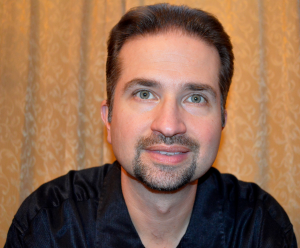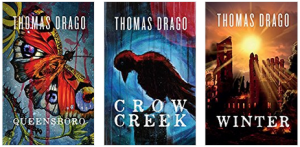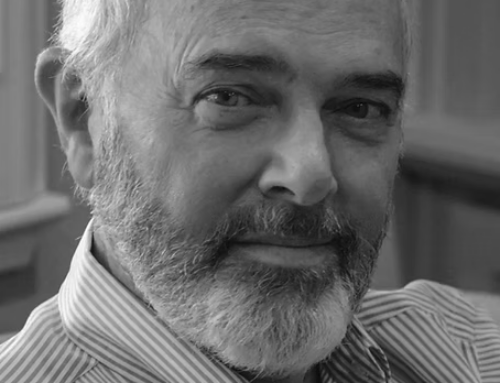 Thomas Drago is the author of the Crow Creek series and teaches drama and English in North Carolina. He has published poems, song lyrics, and short stories, appearing most recently in The Explorer, a local literary magazine.
Thomas Drago is the author of the Crow Creek series and teaches drama and English in North Carolina. He has published poems, song lyrics, and short stories, appearing most recently in The Explorer, a local literary magazine.
He’s a member of the Horror Writers Association. Family legends trace his ancestry to Vlad Dracula. Maybe. His favorite number is 29.
His new book Winter is out now.
Why did you choose to self-publish?
I sold the rights to an independent press that went out of business shortly after, so I figured I’d handle everything myself. Horror has a limited audience. I prefer having ownership of my own imprint and control of marketing.
What tools or companies did you use, and what experience did you have?
I used CreateSpace. They’re user-friendly and very supportive. I’d recommend their services to all aspiring authors.
What did you learn on your journey as an author?
My writing has improved with each book in the Crow Creek series. I’ve also learned that selling books is a marathon, not a sprint. My catalog ships steadily over time. I also think social media has shifted. Facebook and Twitter aren’t the marketing tools they once were.
Winter opens with a prologue that I’d had in mind for a while. A couple of nuclear warheads fell in rural North Carolina by mistake in the early 1960s shortly after JFK campaigned for his presidency. What if those bombs had detonated as part of an assassination attempt? I shuffled the dates slightly and worked some magic.
Winter is the third book in the series. I combined the plots and characters of the first two. Sheriff Gleason rounds up his unlikely band of heroes and goes after Amanda Simmons, the villain who picks up the pieces of Carolina Entech, an insidious medical laboratory. The universe is infinite but wants to be smaller. That’s a central theme of the novel.
Would you self-publish again?
Absolutely.
What do you think are the main pitfalls for indie writers?
Not having a reliable editor and critical beta readers. I teach my students the importance of feedback and revision. I follow that model. You can’t write in a vacuum. Art is collaborative.
As a writer, what is your schedule? How do you get the job done?
Stephen King once said you have to complete the first draft of a novel in three months, regardless of the length, or give up. I abide by that rule. I write at least a thousand words a day. I break up my work into three short sessions. Maybe forty-five minutes at a time. No more. I also don’t outline. As an actor, I improvise my characters and scenes. I do the same when I write. I compose in the moment. When I start planning ahead, I fall off my game.
What tips can you give other authors looking to self-publish?
Be patient. The world you create will still exist. Don’t be afraid to use free giveaways, especially if your work’s been out for a while. They bring your audience around to your latest offer.
What was your steepest learning curve during the publishing process?
Building reviews takes time. You want to wake up and see a hundred five-star reviews waiting for you on your Goodreads page or Amazon profile. It doesn’t usually work they way.
Why did you want to write a book?
I always have a story to tell. I prefer novels because I like taking the time to develop my plot and characters. I struggle more with short stories because of the limited space.

I write horror stories, but really my books are difficult to classify. They’re thrillers, supernatural, science fiction, crime. My creative writing professor in graduate school once said I write literary horror. That’s what I always aim for, anyhow. It sets me apart from the typical horror writer.
Who are your biggest writing inspirations?
Stephen King. Edgar Allan Poe. Those are the two biggest.
What are your plans now your book is published?
I won a contest to attend the Borderlands Press Writers Boot Camp in January. Peter Straub is a guest instructor. His Ghost Story is one of the greatest horror novels ever written. I’m anxious to learn as much as I can while there. After, I’ll pick up the Crow Creek series and see where it takes me. I’d love to see the series adapted into graphic novels or for television.
How do you deal with writer’s block?
I set realistic expectations for myself. If I ever get stuck, I mix up the point-of-view. That helps. I also don’t force myself to tell a story in order. Structure only matters for the final copy.
What have you learned from this experience?
Self-publishing gives me an immediate audience. I’m getting old and don’t have time to wait around for publishers or editors or agents swamped by writers pitching their next great bestseller.
How do your friends and family get involved with your writing? What do they think of your book?
I don’t like selling to my closest family members and friends. If they want to support me, great. I definitely rely on a handful of them for feedback and criticism, however.<
Why did you write about this particular subject?
As an artist, I feel compelled to address the human condition. This often leads me to social commentary or political assessment. I don’t feel like I have a voice in the real world. Fiction give me the escape I need to express emotion and judgment.
What authors do you like to read and why?
I love Chad Kultgen. He’s not horror, but I’ve learned so much from him. He’s brutally honest. I’m also hooked on Julia Crouch. She’s a British domestic Noir author. I highly recommend her books. She has a theatre background like I do and is a master of scenic detail.
Links
Author Site
Facebook
Twitter
Amazon
Goodreads
Get an Editorial Review | Get Amazon Sales & Reviews | Get Edited | Get Beta Readers | Enter the SPR Book Awards | Other Marketing Services























Leave A Comment